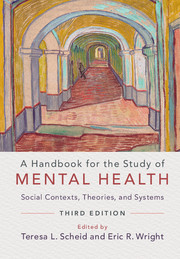A Handbook for the Study of Mental Health
With chapters written by leading scholars and researchers, the third edition of A Handbook for the Study of Mental Health provides an updated, comprehensive review of the sociology of mental health. The volume presents an overview of the historical, social, and institutional frameworks for understanding mental health and illness. Part I examines the social factors that shape psychiatric diagnosis and the measurement of mental health and illness, the theories that explain the definition and treatment of mental disorders, and cultural variability in mental health. The section addresses the DSM-5 and its potential influence on diagnosis and research on mental health outcomes. Part II investigates the effects of social context on mental health and illness. Part III focuses on the organization, delivery, and social context of mental health treatment. The chapters in Part III address the likely impact of the Affordable Care Act on mental health care. This volume is a key resource for students, researchers, advocates, and policymakers seeking to understand mental health and mental health delivery systems.
- With two new chapters and substantial revisions on mental health policy, the volume analyzes the impact of the passing of the Affordable Care Act on mental health care
- Several new chapters address the DSM-5 and its potential influence on diagnosis and research on mental health outcomes
- Due to an increased attention on adolescent suicide and prevention efforts in mental health, new chapters have been added to address these issues
Product details
July 2017Paperback
9781316500965
818 pages
253 × 178 × 38 mm
1.69kg
36 b/w illus. 15 tables
Available
Table of Contents
- Foreword David Mechanic
- Part I. Theoretical Perspectives on Mental Health and Illness Teresa L. Scheid and Eric R. Wright:
- 1. An overview of sociological perspectives on the definitions, causes, and responses to mental health and illness Allan V. Horwitz
- 2. The measurement of mental disorder Jerome C. Wakefield and Mark F. Schmitz
- 3. Defining mental disorders: sociological investigations into the classification of mental disorders Owen Whooley
- 4. The dual continua model: the foundation of the sociology of mental health and mental illness Corey L. M. Keyes
- 5. What outcomes should the study of mental health try to explain? Jason Schnittker
- 6. Biological approaches to psychiatric disorders: a sociological approach Sharon Schwartz and Cheryl Corcoran
- 7. Sociological approaches to mental illness Peggy Thoits
- 8. Mental health in cross-cultural context Harriet P. Lefley
- Part II. The Social Context of Mental Health and Illness Teresa L. Scheid and Eric R. Wright:
- 9. Studying stress in the twenty-first century: stress concepts and research Blair Wheaton and Shirin Montazer
- 10. Understanding the connection between social support and mental health Robyn Lewis Brown and Gabriele Ciciurkaite
- 11. Work and unemployment as stressors Laura Limonic and Mary Clare Lennon
- 12. Socioeconomic stratification and mental disorder William W. Eaton and Carles Muntaner
- 13. Gender and mental health Sara Rosenfield, Dena Smith and Kelly Kato
- 14. Race and mental health David R. Williams, Manuela Costa (Wiedemeier) and Jacinta P. Leavell
- 15. African American women and mental well-being: the triangulation of race, gender, and socioeconomic status Verna M. Keith and Diane R. Brown
- 16. Marital status and mental health Kristi Williams, Adrianne Frech and Daniel L. Carlson
- 17. Well-being across the life course John Mirowsky and Catherine Ross
- 18. Mental health and terrorism Robert J. Johnson, Stevan E. Hobfoll and Isabelle Beulaygue
- Part III. Mental Health Systems and Policy Teresa L. Scheid and Eric R. Wright:
- 19. Labeling and stigma Bruce G. Link and Jo Phelan
- 20. The context and dynamic social processes underlying mental health treatment: classic and contemporary approaches to understanding individuals' responses to illness in light of the Affordable Care Act Bernice A. Pescosolido and Carol A. Boyer
- 21. Community mental health care organizations Kerry Dobransky
- 22. Integrating service delivery systems for persons with severe mental illness Gary S. Cuddeback and Joseph P. Morrissey
- 23. Mental illness and the criminal justice system Virginia Aldigé Hiday and Bradley Ray
- 24. Cultural diversity and mental health treatment Bonki Woo, Emily Walton and David T. Takeuchi
- 25. Preventing adolescent suicidal behavior: integrating sociology and public health Alexander Crosby and Leigh A. Willis
- 26. The mental health consumers/survivors movement in the US Athena McLean
- 27. The HIV-mental health challenge James Walkup and Stephen Crystal
- 28. Mental health policy in the United States: critical reflection and future directions for sociological research Dennis P. Watson, Erin L. Adams and Joanna R. Jackson
- Epilogue: the three solitudes of the sociology of mental health William Avison.










